Nepal: You Need To Go Here. Now.
Click Here To See the Full Nepal Photo Album.
5.13.13
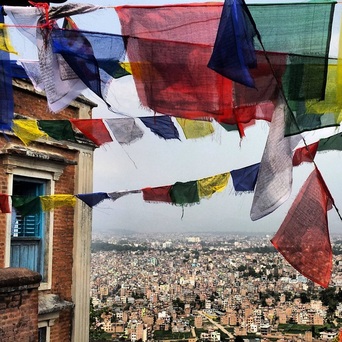
So I'm in Nepal (I'm writing this brief intro after being here for a bit), which I've heard - and just verified - is one of the most beautiful places on Earth. I just happened by a coffee shop, which is where, if you need to, you'll find a gaggle of white folk in any foreign country. This got me thinking: You know what I’ve noticed (some) white people are real good at doing? Looking bored in gorgeous places, being self-proclaimed experts on another country’s culture after being there for 48 hours, not making eye contact with other white people in foreign countries, having absolutely no idea where they’re going and trying to mask that by walking three times the speed of a normal person, wearing 473 bracelets they’ve picked up on their travels, and one-upping you with tales of how they’ve already been to every country you’re going to visit, ever. Here’s a sample conversation with a “backpacker” in, say, a coffee shop. You walk up to them as they’re drinking a coffee, updating their Facebook status*:
*Disclaimer – Not all backpackers are pretentious and patronizing. This is an amalgam of several conversations I’ve had with folks in a couple countries so far, and isn’t representative of the whole by any means. Most have been completely great. Them that are condescending just really, really, reallllly bother me.
*Disclaimer – Not all backpackers are pretentious and patronizing. This is an amalgam of several conversations I’ve had with folks in a couple countries so far, and isn’t representative of the whole by any means. Most have been completely great. Them that are condescending just really, really, reallllly bother me.
You: Hi.
Them: (After lighting a cigarette) Um...hi.
You: How’re you liking it in (insert country)?
Them: Um...yeah, it’s good. Did you just get in?
You: Yeah, I’ve only been here a week.
Them: Oh, hah. You’re new.
You: Yeah, how long have you been here?
Them: *Drag from cigarette* 2 weeks already.
You: Oh.
Them: Yeah...
You: Where are you traveling?
Them: Well, I’m coming from Thailand, Laos, Malaysia, Indonesia, Nepal, Cambodia, Vietnam, India. I’m a backpacker.
You: Oh. Can you recommend anywhere to go or good places to eat?
Them: I mean...yeah? Just go explore, you know? I mean, adventure. That’s the best way to learn. Just don’t eat the (insert local food, said in an attempt at the local language).
You: What’s that?
Them: Hahaha, you haven’t had that? It’s the local staple. You’ll have it with basically like every meal, so yeah...*drag**gazing back to cell phone*
You: OK. Is there a place nearby that sells that?
Them: *still looking at cell phone* Um...yeah. Just go walk, if you get lost, it’s whatever. Just take a taxi back home, but don’t pay more than $5 to go anywhere, or else you’re just getting robbed.
You: OK. Thanks.
Them: *Drag* *Head nod, still looking at cell phone*
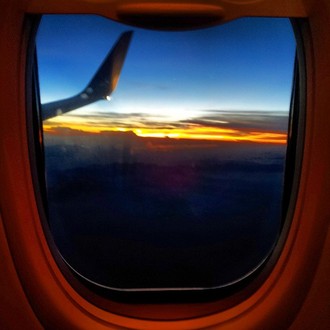
13 hours at the airport in Kuala Lumpur, Malaysia, gave me plenty of time to think about how I'd seen/heard/experienced stuff like this in Vietnam and Cambodia, too. It also gave me time to catch up on some Game of Thrones (which is difficult to do in a public space, what with the pervasive beheadings and boobs and blood and all) and scout out a place to sleep for the night. Which I did. It was a little alcove oasis, dimly lit, with couches. It was too good to be true. After sleeping there for an hour, I was kicked awake by an airport security posse of about 10. They made me and an elderly Chinese man move because they were closing that wing of the airport until morning. OK.
So I hopped the train to a satellite of the airport. I found a spot that seemed serviceable, though nowhere near as good. 20 minutes later, kicked awake again. Moved one more time and thought, “OK. THIS is the spot.” About 30 minutes later I was woken from deep sleep yet again. I was 5 feet past some red tape that wasn’t there when I went to sleep. They were closing that wing of the airport past the red line, so I had to move again. At this point it’s 3am and I concluded the only place in the airport they keep open is the Cinnabon. So, I ‘slept’ in a brightly lit alcove while a family talked at full volume the whole time, let their kids run wild, and sat in the massage chairs but refused to pay so the alarm kept beeping and telling them to leave.
Kuala Lumpur airport 1, Alex 0.
So I hopped the train to a satellite of the airport. I found a spot that seemed serviceable, though nowhere near as good. 20 minutes later, kicked awake again. Moved one more time and thought, “OK. THIS is the spot.” About 30 minutes later I was woken from deep sleep yet again. I was 5 feet past some red tape that wasn’t there when I went to sleep. They were closing that wing of the airport past the red line, so I had to move again. At this point it’s 3am and I concluded the only place in the airport they keep open is the Cinnabon. So, I ‘slept’ in a brightly lit alcove while a family talked at full volume the whole time, let their kids run wild, and sat in the massage chairs but refused to pay so the alarm kept beeping and telling them to leave.
Kuala Lumpur airport 1, Alex 0.
5.14.13
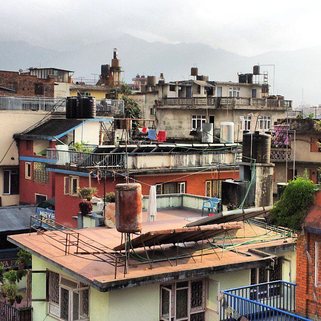
After you get your visa and bags in the airport in Kathmandu - which is an incredibly fast process – and make it outside, you’ll most likely be greeted by a cow, sizing you up as it chews its cud. Or one curled up on the sidewalk like a cat. Incredible. Cows here are sacred, too, so when they wander down the streets, which is rather frequent, traffic veers left and right to accommodate.
Arrived at a guest house in Kathmandu, which is where I’ll be for the next 4 days during orientation. One thing that definitely stuck out at me after walking through the door is the power schedule. In Kathmandu, and many places of Nepal, there are scheduled power outages. Sometimes it’s 8 hours a day, sometimes 16. The schedule is just a rough estimate. That will take some getting used to.
The food, though, is delicious. Nepali food is, to me, a mixture of Indian and Khmer – rice and lentils, which is called Dal Vat, as well as a lot of curries and chapati – a sort of naan/tortilla hybrid. I think I’ll be a-OK with that, likely imminent food poisoning aside.
Took in sunset from the rooftop of the guest house before heading to dinner and, as a way to cap off my first day in Nepal, this was pretty great.
Arrived at a guest house in Kathmandu, which is where I’ll be for the next 4 days during orientation. One thing that definitely stuck out at me after walking through the door is the power schedule. In Kathmandu, and many places of Nepal, there are scheduled power outages. Sometimes it’s 8 hours a day, sometimes 16. The schedule is just a rough estimate. That will take some getting used to.
The food, though, is delicious. Nepali food is, to me, a mixture of Indian and Khmer – rice and lentils, which is called Dal Vat, as well as a lot of curries and chapati – a sort of naan/tortilla hybrid. I think I’ll be a-OK with that, likely imminent food poisoning aside.
Took in sunset from the rooftop of the guest house before heading to dinner and, as a way to cap off my first day in Nepal, this was pretty great.
5.15.13
When I watched the sun set last night, it came to its rest above some low-lying mountains in the distance. Today, I found out that we would be going into the heart of those mountains to a little village named Chitlan on the other side of them. All of the newly arrived volunteers to Nepal (of which there were about 25) hopped into two small buses at 630 this morning and set out for the hills.
Now, I’ve been off-roading before, plenty of times: up the scraggly, lava-laden roads of the big island in Hawaii, in Kenya, and many places in the US. But this, the drive up the mountains to Chitlan, is truly off-road. Aside from the fact there are absolutely no guard rails and the driver goes about 30 around hairpin turns, the road itself is nothing but jagged rock hacked out of, and replanted into, the hardened ground. This ride made for some absolutely jaw-dropping views of the greater Kathmandu valley.
After arriving at a small house on the outskirts of Chitlan, we were treated to ginger tea (delicious) and blessed with red ink on our foreheads by the mother of the house, a symbol of respect and hope for a long life. After a brief break, it was back into the vans for a drive into the village and a hike through the forests of Chitlan, down to a lake. Maybe I’m just being homesick, but I’ll be damned if the forest here didn’t smell exactly the same as back home at the height of summer – fresh pine and evergreen trees happens to be one of my favorite smells in all the world, and Chitlan had these in spades. We also happened upon a Nepali music video being filmed on the side of one of the slopes.
At the conclusion of the small little hike, we came to a lake – manmade, but no less beautiful because of it. I could do my best to write some flowery words here, but I’ve better faith in my ability to say the same thing more eloquently with a photo.
We crossed a really large suspension bridge after taking a ride in a canoe and doing a bit of scrambling up the side of a cliff, and happened to emerge on the backside of a farm in the village; it was awesome
Arrived back at the homestay just as a rainstorm was moving in. One of my favorite simple things in the world is falling asleep to the sound of a torrential downpour drumming it’s tune on the top of a metal roof. Tonight, after having a delicious Nepali meal, I slept in an unfinished house the size of a small garage with 4 of the other volunteers. My bed was basically a piece of plywood, but was one of the most sound nights of sleep I’ve had on the whole trip, spiders crawling along my face at multiple times in the middle of the night aside.
Now, I’ve been off-roading before, plenty of times: up the scraggly, lava-laden roads of the big island in Hawaii, in Kenya, and many places in the US. But this, the drive up the mountains to Chitlan, is truly off-road. Aside from the fact there are absolutely no guard rails and the driver goes about 30 around hairpin turns, the road itself is nothing but jagged rock hacked out of, and replanted into, the hardened ground. This ride made for some absolutely jaw-dropping views of the greater Kathmandu valley.
After arriving at a small house on the outskirts of Chitlan, we were treated to ginger tea (delicious) and blessed with red ink on our foreheads by the mother of the house, a symbol of respect and hope for a long life. After a brief break, it was back into the vans for a drive into the village and a hike through the forests of Chitlan, down to a lake. Maybe I’m just being homesick, but I’ll be damned if the forest here didn’t smell exactly the same as back home at the height of summer – fresh pine and evergreen trees happens to be one of my favorite smells in all the world, and Chitlan had these in spades. We also happened upon a Nepali music video being filmed on the side of one of the slopes.
At the conclusion of the small little hike, we came to a lake – manmade, but no less beautiful because of it. I could do my best to write some flowery words here, but I’ve better faith in my ability to say the same thing more eloquently with a photo.
We crossed a really large suspension bridge after taking a ride in a canoe and doing a bit of scrambling up the side of a cliff, and happened to emerge on the backside of a farm in the village; it was awesome
Arrived back at the homestay just as a rainstorm was moving in. One of my favorite simple things in the world is falling asleep to the sound of a torrential downpour drumming it’s tune on the top of a metal roof. Tonight, after having a delicious Nepali meal, I slept in an unfinished house the size of a small garage with 4 of the other volunteers. My bed was basically a piece of plywood, but was one of the most sound nights of sleep I’ve had on the whole trip, spiders crawling along my face at multiple times in the middle of the night aside.
5.16.13
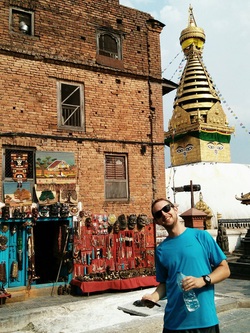
Woke up with to the sun juuust peeking through the cracks of my little hut, had breakfast, and played soccer on the most cow-pie laden field that may ever have existed. I gained three realizations during the game: 1) there’s a reason I quit soccer in 1st grade and just started running instead, 2) the fact that I hadn’t really played in 20 years doesn’t bode well for a pickup game with locals that’s surprisingly competitive, and 3) the smog and heat or Vietnam and Cambodia, coupled with not having been able to workout for the last two months, married to the elevation of Chitlan, makes me feel like a 2 pack a day smoker. All that being what it is, it was fun all the same, and my lungs thanked me for the little bit of exercise I was able to bequeath upon their now fragile lining.
After an equally precarious bus ride back to Kathmandu, we went as a group to the “Monkey Temple” in Kathmandu. This site, perched upon one of the highest hills of the whole city, provided a 360 panorama of the whole of Kathmandu, prayer wheels and monkeys aplenty, and just really fun times in general. If and when you go to Kathmandu, it’s definitely worth a trip up.
With a few hours of free time at night, before the 8 hour bus ride to the volunteer placement of the northwestern Nepali city of Pokhara, I did what any sensible Westerner would do in one of the most mystical cities in the world: I went and drank a protein shake while watching the new Star Trek movie in 3D in the movie theater at the top of the local mall. For $5 in total for it all, it was tough to say no, and far be it from me to turn a cold shoulder to Benedict Cumberbatch’s mellifluous voice.
So, we’re at the movie and things are getting pretty intense midway through act two. Then, the movie just stops and the lights in the theater come up. I thought the movie was kaput. Thankfully, this wasn’t the case. It was just time for a 10 minute “interval” break, which is nothing but Nepali commercials (some in English, others local) for soap, coffee, pvc pipes, concrete, and flowers. Then back to the movie.
P.S. The new Star Trek is fantastic. Watch it and be merry.
After an equally precarious bus ride back to Kathmandu, we went as a group to the “Monkey Temple” in Kathmandu. This site, perched upon one of the highest hills of the whole city, provided a 360 panorama of the whole of Kathmandu, prayer wheels and monkeys aplenty, and just really fun times in general. If and when you go to Kathmandu, it’s definitely worth a trip up.
With a few hours of free time at night, before the 8 hour bus ride to the volunteer placement of the northwestern Nepali city of Pokhara, I did what any sensible Westerner would do in one of the most mystical cities in the world: I went and drank a protein shake while watching the new Star Trek movie in 3D in the movie theater at the top of the local mall. For $5 in total for it all, it was tough to say no, and far be it from me to turn a cold shoulder to Benedict Cumberbatch’s mellifluous voice.
So, we’re at the movie and things are getting pretty intense midway through act two. Then, the movie just stops and the lights in the theater come up. I thought the movie was kaput. Thankfully, this wasn’t the case. It was just time for a 10 minute “interval” break, which is nothing but Nepali commercials (some in English, others local) for soap, coffee, pvc pipes, concrete, and flowers. Then back to the movie.
P.S. The new Star Trek is fantastic. Watch it and be merry.
5.17.13
After hearing that the city of Pokhara is about 20 degrees cooler than I’ve experienced the last couple months in Vietnam and Cambodia, I jumped at the chance to volunteer there for my orphanage placement. The fact that the city is nestled up against several of the most distinct peaks in the Himalayas is just an added bonus. The only thing separating me from the most majestic mountain range in the world, and a month-long respite from sweating before, during, and after showering is an 8 hour bus ride.
Up at 5:30 to catch the bus and say goodbye to the local staff at the guest house in Nepal. It’s quite something how quickly it’s possible to grow instantly nostalgic for a place and people you’ve only experienced and known for a number of days.
Pokhara is only 250 kilometers (about 180 miles) from Kathmandu. On the freeways back home, this would be about a 3 hour trip. Here not so much. The corkscrewing roads accompanied by the endless stream of big rigs, construction trucks, taxis, motorcycles, and cows made the journey a good 8 hours. Ordinarily, I’d take this as an opportunity to catch up on some sorely needed sleep. But, ordinarily, buses tend to have shocks and suspension systems, and roads tend to be flat.
Up at 5:30 to catch the bus and say goodbye to the local staff at the guest house in Nepal. It’s quite something how quickly it’s possible to grow instantly nostalgic for a place and people you’ve only experienced and known for a number of days.
Pokhara is only 250 kilometers (about 180 miles) from Kathmandu. On the freeways back home, this would be about a 3 hour trip. Here not so much. The corkscrewing roads accompanied by the endless stream of big rigs, construction trucks, taxis, motorcycles, and cows made the journey a good 8 hours. Ordinarily, I’d take this as an opportunity to catch up on some sorely needed sleep. But, ordinarily, buses tend to have shocks and suspension systems, and roads tend to be flat.
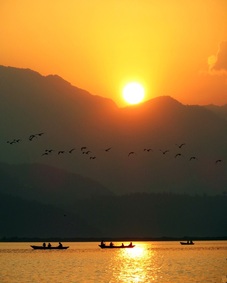
This was tantamount to being on the open ocean in a dingy with irregular whitecaps slapping the boat hither and tither. Or, the most low-budget amusement ride of all time. Despite the lack of sleep, and several dozen times I was jettisoned from my chair and hit my head on the luggage compartment, it was a fun ride. The scenery, and being able to see remote mountain villages, made it all worth it. As did the view I was met with upon arriving in Pokhara.
There’s a reason David Attenborough makes his voice so epic anytime he mentions the Himalayas on Planet Earth: because they are. Taking in sunset by Phewa lake as the last rays of sun kiss the tip of Fishtail Mountain is one of those moments that will occupy a space in my memory bank until I’m senile and forget this trip happened. The knowledge that this will be my home for the next month, and that I get to see this every day (weather permitting) is some pretty great news. I hope I don’t take it for granted.
5.18.13
Today is a day of rest before starting at the orphanage tomorrow, which meant a day to explore the city. I’m in lakeside district of Pokhara, which is quiet, quaint, and packed with tourists here to go trekking, paragliding, etc. Ample opportunity to buttress my claims of white people at the beginning of this journal shall be had.
The rain here is something else, and it’s awesome. Monsoon season is quickly moving in, and that makes for flooded streets, nighttime lightning storms, and a return of one of my favorite pastimes: sitting under a metal roof with a cup of tea, my pen and pad for lyrics, and the sound of rain drumming away above me.
The rain here is something else, and it’s awesome. Monsoon season is quickly moving in, and that makes for flooded streets, nighttime lightning storms, and a return of one of my favorite pastimes: sitting under a metal roof with a cup of tea, my pen and pad for lyrics, and the sound of rain drumming away above me.
5.19.13
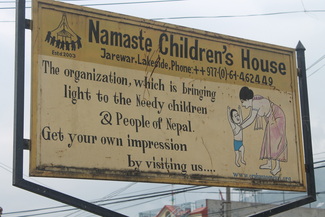
My placement at the orphanage was handled through a fantastic Nepali organization called “Hope and Home.” Locally, they specialize in placing volunteers in orphanages, English teaching, and medical outreach. They were responsible for coordinating everything upon arrival, setting up the homestay in Kathmandu and Pokhara, the bus ride up here, and the weekend trips to Chitlan and the Monkey Temple. They also accompanied all the volunteers on the trip to Chitlan and taught several Nepali language lessons. I highly recommend them to anyone who wants to volunteer in Nepal.
Placement #6: Namaste Children’s Home
It took all of about 5 minutes to realize that my new placement, Namaste Children’s Home, is a shining example of how orphanages should be run. I’ve been taking mental notes during my travels of traits an ideal orphanage would and would not have, just in case I were to ever open one someday. Namaste checks off many of my prerequisites, and then some.
- Every staff member is compassionate, polite, and caring. All of their job duties, their days off, and any notes are left on a whiteboard for all to see.
- There are pictures of each of the children on the wall, their names underneath.
- In the office, there is a binder that has info, progress reports, report cards, artwork, and medical histories of the kids.
- There is a schedule posted on the wall, adhered to daily. It includes, among other things, three scheduled meals and one snack, exercise time, yoga, reading time, school, cleaning time, etc.
- Cleaning duties are split evenly between all of the children, also on a schedule.
- Volunteers are not allowed to talk about religion with the children, swear, or smoke or drink.
- The children all go to a secondary school a ten minute walk up the road.
- Aside from housing 47 children, Namaste is an advocate for keeping children at home with their families or relatives, when possible, circumventing the desire by some families to send children to an orphanage for a better chance at an education. They do this by providing scholarships to impoverished kids in many different regions of Nepal.
- They have a counselor on-site six days a week for the kids to talk to.
- They are active in – and encourage the kids to be active in – the community. This is evidenced by the fact they organize blood drives, garbage clean-up days, organize hearing clinics, etc.
There are many other incredible positives here, but those are some highlights. I only got to meet the kids briefly today, but I can already tell I’m going to love it here.
Placement #6: Namaste Children’s Home
It took all of about 5 minutes to realize that my new placement, Namaste Children’s Home, is a shining example of how orphanages should be run. I’ve been taking mental notes during my travels of traits an ideal orphanage would and would not have, just in case I were to ever open one someday. Namaste checks off many of my prerequisites, and then some.
- Every staff member is compassionate, polite, and caring. All of their job duties, their days off, and any notes are left on a whiteboard for all to see.
- There are pictures of each of the children on the wall, their names underneath.
- In the office, there is a binder that has info, progress reports, report cards, artwork, and medical histories of the kids.
- There is a schedule posted on the wall, adhered to daily. It includes, among other things, three scheduled meals and one snack, exercise time, yoga, reading time, school, cleaning time, etc.
- Cleaning duties are split evenly between all of the children, also on a schedule.
- Volunteers are not allowed to talk about religion with the children, swear, or smoke or drink.
- The children all go to a secondary school a ten minute walk up the road.
- Aside from housing 47 children, Namaste is an advocate for keeping children at home with their families or relatives, when possible, circumventing the desire by some families to send children to an orphanage for a better chance at an education. They do this by providing scholarships to impoverished kids in many different regions of Nepal.
- They have a counselor on-site six days a week for the kids to talk to.
- They are active in – and encourage the kids to be active in – the community. This is evidenced by the fact they organize blood drives, garbage clean-up days, organize hearing clinics, etc.
There are many other incredible positives here, but those are some highlights. I only got to meet the kids briefly today, but I can already tell I’m going to love it here.
5.20.13
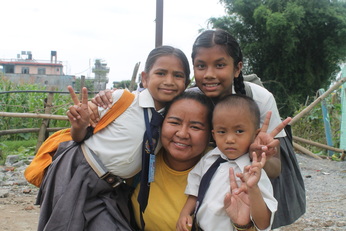
One thing for which I’m really grateful is it looks like there will be a bit of a daily routine here, and within that there will be clear help that I can lend and work with which I can help. This is the first time on the whole journey so far where this has been the case, so I’m kind of excited about it. The schedule today, which the house mom and house sisters said will be standard moving forward, was this:
8:30 – I arrive and help the kids get ready for school. In the boy’s room, this means helping them get dressed, make sure they have brushed their teeth, etc.
9:30 – Walk all of the kids – ages 4-16 – to school.
10:00 – Return back and help with cleaning. Mop one of the floors, sweep, help with laundry, etc.
11:00 – 2:00 – Lunch break
2:00 – Return back to Namaste, help with food prep: cut pounds of vegetables, clean dishes, etc.
3:00 – Walk back to the school to be there when the kids get out of class, and walk them home.
4:00 – Play with the kids, help them with any pressing homework, just be present.
5:00 – Head home.
While there are only a couple hours of interaction each day with the kids, if today is any indication, it will certainly be a case of quality over quantity. Even though they’ve had dozens of volunteers (who they call “auntie” and “uncle”) come and go in the past, they certainly know how to help you feel welcome and unique. I was immediately shown photo albums by several of the boys, their excitement over sharing their life in pictures an awesome thing.
8:30 – I arrive and help the kids get ready for school. In the boy’s room, this means helping them get dressed, make sure they have brushed their teeth, etc.
9:30 – Walk all of the kids – ages 4-16 – to school.
10:00 – Return back and help with cleaning. Mop one of the floors, sweep, help with laundry, etc.
11:00 – 2:00 – Lunch break
2:00 – Return back to Namaste, help with food prep: cut pounds of vegetables, clean dishes, etc.
3:00 – Walk back to the school to be there when the kids get out of class, and walk them home.
4:00 – Play with the kids, help them with any pressing homework, just be present.
5:00 – Head home.
While there are only a couple hours of interaction each day with the kids, if today is any indication, it will certainly be a case of quality over quantity. Even though they’ve had dozens of volunteers (who they call “auntie” and “uncle”) come and go in the past, they certainly know how to help you feel welcome and unique. I was immediately shown photo albums by several of the boys, their excitement over sharing their life in pictures an awesome thing.
5.21.13
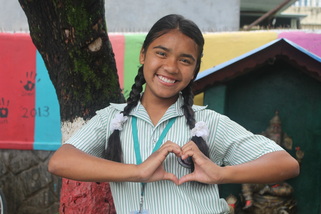
Today it poured. That’s saying something coming from a guy who basically grew up in the middle of a deciduous rainforest. After having a morning of slowly getting to know each child a little bit more in a huge group setting, I got the chance to talk with one of the kids one on one.
During days where it rains, Namaste sends their driver and SUV over to Step-by-Step, their school, to pick up the kids. Usually they take two trips. Today, unbeknownst to me and one of the older kids, they only took one. I was told by one of the house sisters to wait for the car to come back as I watched it pull out of the parking lot with a fellow volunteer and about 25 kids (there’s a canopy in the back where they sit, in case you’re wondering how 25 kids fit into an SUV. It’s still kind of clown car-ish). So, we did. We waited. And waited. And waited some more. I walked over to the security guard of the school and asked if he could call Namaste (he knows the number, as all of the kids at Namaste go to the school). After a conversation in which he had a few bouts of hearty laughter he hung up and told me, “yeah, no one’s coming for you” and gave me a smack on the back.
So, Dipak (in his school uniform) and I (in a rainjacket and flip-flops) trekked back through the mud and garbage and cowpies to Namaste. He told me about his life growing up, asked me about America, and laughed at me every time my flip-flop stuck into the mud like some crude epoxy. Undoubted bovine poop on my feet, this walk back will still be one of my favorite memories from this whole trip, I’m sure. The look on the house sister’s face when she saw us approach looking like two drowned rats was priceless and worth the journey alone.
Also, while I was waiting, I got into a conversation with a man who turned out to be the principal of the school. When I told him I was from America, and that I’m traveling as a documentarian, he excitedly let me know about his son who’s currently going to film school in Los Angeles. He then introduced me to his wife, a teacher at the school, and invited me to their house for dinner. I said, “hey, that sounds great, but I don’t know what my sched-“. “-That’s great,” he said, “it’s decided. Then we’re agreed. You will come to dinner at our house.” It’s hard to say you don’t know if you’ll be able to attend because of your schedule when the only acceptable response is “Yes. Yes we’re agreed.”
During days where it rains, Namaste sends their driver and SUV over to Step-by-Step, their school, to pick up the kids. Usually they take two trips. Today, unbeknownst to me and one of the older kids, they only took one. I was told by one of the house sisters to wait for the car to come back as I watched it pull out of the parking lot with a fellow volunteer and about 25 kids (there’s a canopy in the back where they sit, in case you’re wondering how 25 kids fit into an SUV. It’s still kind of clown car-ish). So, we did. We waited. And waited. And waited some more. I walked over to the security guard of the school and asked if he could call Namaste (he knows the number, as all of the kids at Namaste go to the school). After a conversation in which he had a few bouts of hearty laughter he hung up and told me, “yeah, no one’s coming for you” and gave me a smack on the back.
So, Dipak (in his school uniform) and I (in a rainjacket and flip-flops) trekked back through the mud and garbage and cowpies to Namaste. He told me about his life growing up, asked me about America, and laughed at me every time my flip-flop stuck into the mud like some crude epoxy. Undoubted bovine poop on my feet, this walk back will still be one of my favorite memories from this whole trip, I’m sure. The look on the house sister’s face when she saw us approach looking like two drowned rats was priceless and worth the journey alone.
Also, while I was waiting, I got into a conversation with a man who turned out to be the principal of the school. When I told him I was from America, and that I’m traveling as a documentarian, he excitedly let me know about his son who’s currently going to film school in Los Angeles. He then introduced me to his wife, a teacher at the school, and invited me to their house for dinner. I said, “hey, that sounds great, but I don’t know what my sched-“. “-That’s great,” he said, “it’s decided. Then we’re agreed. You will come to dinner at our house.” It’s hard to say you don’t know if you’ll be able to attend because of your schedule when the only acceptable response is “Yes. Yes we’re agreed.”
5.22.13
My first day off today and, with a laundry list larger than Valentina Vassilyeva’s on linen cleaning day, saw me accomplish exactly two to-do’s: help out at a blood drive put together by Namaste, and drink a good cup of coffee. Regarding the first: it was an outdoor blood drive, under a tent, and my task was more or less to peel hardboiled eggs and keep an eye on anyone passing out. For the coffee quest, I found a cafe overlooking the lake and had the best mocha of my life (I decided to go a little sweeter than coffee) for about a buck.
Done and done.
Done and done.
5.23.13
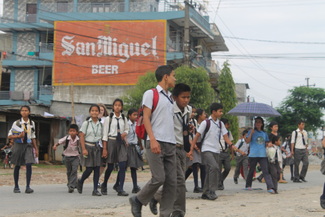
Walking the kids to school in the morning always renews any bouts of the blues or malaise, for a couple reasons. The first is that they hold your hand (what they call “touch hands”), with no barrier for gender or age. From the older kids to the younger ones, boys or girls, they all like to hold hands of their ‘aunts and uncles.’ Just that little bit of connection is good medicine for the soul.
The second is that the majority of them, in stark contrast to almost every kid back home (including me way, back when), are genuinely happy and excited to go to school, to learn, and to grow. The difference might be that education in Nepal is a privilege, not a right, and it’s for that very reason that it’s not taken for granted. Rather, it’s viewed as a way to build a foundation for a brighter future, and a solo endeavor toward wisdom and a lifetime of learning. Refreshing.
The second is that the majority of them, in stark contrast to almost every kid back home (including me way, back when), are genuinely happy and excited to go to school, to learn, and to grow. The difference might be that education in Nepal is a privilege, not a right, and it’s for that very reason that it’s not taken for granted. Rather, it’s viewed as a way to build a foundation for a brighter future, and a solo endeavor toward wisdom and a lifetime of learning. Refreshing.
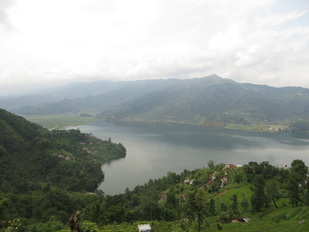
In the afternoon, my fellow volunteers and I went on a quest to the top of a nearby hill (I would say mountain, but that’s tough to say when everything is in the shadow of the Himalayas). At the top of this hill is a famous attraction that adorns a good majority of the postcards in Pokhara’s local bookstores: the World Peace Pagoda. Here’s a picture of it from the ground.
In order to get there you can either take a taxi to the top (yawn) or take a boat across Phewa Lake and hike (tough) – we chose the latter.
The view at the top was gorgeous, and was definitely worth being made to feel I was a noodley-armed man with the strength of a newly hatched, mutated chick on a KFC chicken farm.
In order to get there you can either take a taxi to the top (yawn) or take a boat across Phewa Lake and hike (tough) – we chose the latter.
The view at the top was gorgeous, and was definitely worth being made to feel I was a noodley-armed man with the strength of a newly hatched, mutated chick on a KFC chicken farm.
5.24.13
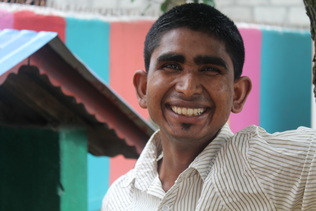
Every other week, the kids at Namaste have an event called “Funny Friday.” Saturday is their lone day off during the week, so when they get back from school on Friday, it’s an extra sweet feeling: the longest point there is before more school. Funny Friday is a way for the kids to showcase their talents – like dancing, singing, comedy, drama, etc. - in front of everyone else, and this is an awesome thing for a number of reasons. Among many others, it fosters creativity, confidence in public performing, and camaraderie. It’s just an added bonus that some of the kids are really, really talented.
When the kids learned I was a rapper, I was signed up without any say-so from my end to perform at said Funny Friday. I rapped my song “Simpleman” for them, and they enjoyed it enough to ask me if I could lead a rap class for some of the kids in the upcoming weeks. Heck yes! So, starting next week, I’ll teach a rap class to a couple of the kids who want to learn the art. I’m excited for this.
When the kids learned I was a rapper, I was signed up without any say-so from my end to perform at said Funny Friday. I rapped my song “Simpleman” for them, and they enjoyed it enough to ask me if I could lead a rap class for some of the kids in the upcoming weeks. Heck yes! So, starting next week, I’ll teach a rap class to a couple of the kids who want to learn the art. I’m excited for this.
5.25.13
The folks who run Namaste purchased some property about 15 kilometers outside of Pokhara. Their goal, in about 4 years time, is to move the entire orphanage onto this property and also build a women’s empowerment center, renovate the local medical outpost and school, and have some self-sustained agriculture. We were invited to go out there to a housewarming party of sorts with the other workers at Namaste, to plant trees, and to meet the villagers. Though within earshot of Pokhara it felt like it was worlds away (the 10 kilometers/hour travel average added to this feeling, too).
It was absolutely gorgeous. The clouds just started to part as we finished planting the trees, and we could make out the faint outline of some Himalayan peaks. I can see why they want to move out here. What an incredible place this would be to grow and flourish for the kids. To be able to run around in the fresh air removed from the bustle of the city (but still near enough) and just...be kids, would be good medicine.
Equally inspiring is that Namaste isn’t just moving out to this village to build and shoehorn themselves into the community. Rather, they’re engaging the community and actively participating in cultivating something local from the ground up. By renovating the school and medical outpost, they are giving work to the locals and involving them in every development. Sustainability is a great thing.
On the way back home, I got to ride on the top of a bus! My seat was initially on steel rebar, which wasn’t the most pleasant. So I changed to riding above the cab, which wasn’t the safest. I had a little lip of metal to grab onto, and my feet were sliding around on the hot sheet metal roof like an elephant trying to tap-dance in the Arctic. There were three times I was positive I was going to slide off the top to my imminent demise below, but here we are. I also met a Nepali soldier who worked as a peacekeeper for the UN in the Congo a few years back.
It was absolutely gorgeous. The clouds just started to part as we finished planting the trees, and we could make out the faint outline of some Himalayan peaks. I can see why they want to move out here. What an incredible place this would be to grow and flourish for the kids. To be able to run around in the fresh air removed from the bustle of the city (but still near enough) and just...be kids, would be good medicine.
Equally inspiring is that Namaste isn’t just moving out to this village to build and shoehorn themselves into the community. Rather, they’re engaging the community and actively participating in cultivating something local from the ground up. By renovating the school and medical outpost, they are giving work to the locals and involving them in every development. Sustainability is a great thing.
On the way back home, I got to ride on the top of a bus! My seat was initially on steel rebar, which wasn’t the most pleasant. So I changed to riding above the cab, which wasn’t the safest. I had a little lip of metal to grab onto, and my feet were sliding around on the hot sheet metal roof like an elephant trying to tap-dance in the Arctic. There were three times I was positive I was going to slide off the top to my imminent demise below, but here we are. I also met a Nepali soldier who worked as a peacekeeper for the UN in the Congo a few years back.
5.26.13
I had a day off today, but had food poisoning (or what the locals call “Delhi Belly” or “Nepali Belly”.) So, I read for a while, drank water, and stayed pretty near to the turlet all day. Grumble. The end.
5.27.13
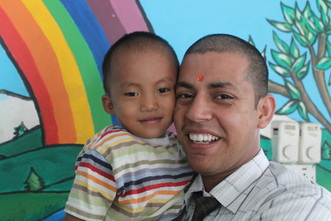
Rishi, the in-charge of Namaste/counselor for the kids at Namaste, asked me if I could take pictures of the kids today for their files, which would also serve as the annual picture update for their sponsors around the world of their progress. It may have been because he saw my somewhat fancy-pants camera, or because he trusted my eye as a photographer, but I'm going with the former since he had no reference point for the latter and I'm farsighted. So, the kids all filed out of the house one-by-one in their crisply pressed school uniforms and drowsily forced a smile for the camera while my haphazard attempts to make them smile were only marginally successful (and then, ultimately, largely successful probably because they took sympathy on me making an ass of myself.)
When they got back from school I took their "casual" pictures, per Rishi's request. Casual in quotes because they were posed in a casual way, like "hey, look at me casually reading" or "hey, look at me in mid-swing playing ping-pong." In other words, it's tough to get candid shots when one of the requirements is they are to be posed. That said, it was fun, and many of the kids probably got tired of me turning their orphanage into a Yuen Lui studio by the end of the day.
(You can see some of the pictures from this shoot throughout the course of this journal.)
When they got back from school I took their "casual" pictures, per Rishi's request. Casual in quotes because they were posed in a casual way, like "hey, look at me casually reading" or "hey, look at me in mid-swing playing ping-pong." In other words, it's tough to get candid shots when one of the requirements is they are to be posed. That said, it was fun, and many of the kids probably got tired of me turning their orphanage into a Yuen Lui studio by the end of the day.
(You can see some of the pictures from this shoot throughout the course of this journal.)
5.28.13
One of the risks that can come with volunteering or helping another, in any capacity, is that the contributions of the volunteer or helper could lead to dependence on the help always being present. For example, if a constant stream of aid workers provide food to a country after a natural disaster, with no effort to rebuild, the citizens of the country will be left no better in the long-term or in a position to feed themselves once the aid workers leave. If an orphanage only provides children with food and a place to rest their head without education or development of life-skills, the children in the orphanage will not be able to care for themselves once they leave the orphanage's care. It's the whole give a person a fish vs. teach a person to fish thing. I had a conversation with Visma, the founder and director of Namaste about this very topic. His responses and insights further
5.29.13
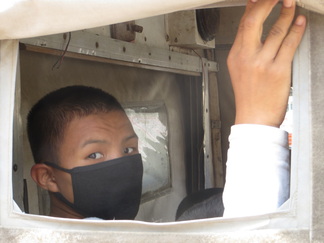
Field trip day today! We were told we were going to take the kids to the circus today, which would ordinarily be fine, but there's one massive thing wrong with this: I. Hate. Clowns. A lot. And I'm afraid of clowns. A. Lot. Offense unintended to any clowns who read this, but there's something unnerving about a grown-up who makes the conscious choice to wear overbearingly happy makeup and make whooping noises and balloon animals.
For as long as I can remember, clowns have made me depressed, because I felt someone who had to paint their happiness probably had some deep-seated depression and probably a shiv waiting for my spinal column if I looked at them the wrong way. Or, they would turn into Stephen King's "It." With that in mind, you can imagine my relief when what we showed up to wasn't a circus at all, but a dance/gymnastics display for the kids to watch. Score.
The most entertaining part of the whole performance wasn't the dancing itself (though that was good, too), it was the reactions of Dipak sitting next to me as he watched the dancing. Seeing the smile on his face and all of the other kids at Namaste made the car-ride back in which I stood in a crouched position and hit my head on the metal roof of a truck canopy at each bump we encountered worth it.
For as long as I can remember, clowns have made me depressed, because I felt someone who had to paint their happiness probably had some deep-seated depression and probably a shiv waiting for my spinal column if I looked at them the wrong way. Or, they would turn into Stephen King's "It." With that in mind, you can imagine my relief when what we showed up to wasn't a circus at all, but a dance/gymnastics display for the kids to watch. Score.
The most entertaining part of the whole performance wasn't the dancing itself (though that was good, too), it was the reactions of Dipak sitting next to me as he watched the dancing. Seeing the smile on his face and all of the other kids at Namaste made the car-ride back in which I stood in a crouched position and hit my head on the metal roof of a truck canopy at each bump we encountered worth it.
5.30.13
One of the most memorable sunrises I've seen in my twenty some-odd years of puttering around our planet was at the Grand Canyon with my girlfriend Megan a few summers back. There's something magic about being awake before the sun and watching the dance it puts on every day and has done for the last couple billion years. That magic is amplified when it's done at a place that is in and of itself spectacular. Sarangkot, a little village at the top of a mountain on the outskirts of Pokhara, is one such place.
Last night was the first night since arriving in Pokhara where I could see stars in the sky. My friends and I figured it was our best shot at seeing a clear sunrise over the Himalayas, too. So, we awoke at 3:45, booked a taxi for 4, and groggily made the trek up. Worth it. I almost felt like I could reach out and touch several of the peaks in the Himalayas. Watching the first golden slivers just glance the top of the snowfilled peaks before cascading down into the valleys below will undoubtedly go down as one of the more memorable experiences of this journey.
Last night was the first night since arriving in Pokhara where I could see stars in the sky. My friends and I figured it was our best shot at seeing a clear sunrise over the Himalayas, too. So, we awoke at 3:45, booked a taxi for 4, and groggily made the trek up. Worth it. I almost felt like I could reach out and touch several of the peaks in the Himalayas. Watching the first golden slivers just glance the top of the snowfilled peaks before cascading down into the valleys below will undoubtedly go down as one of the more memorable experiences of this journey.
5.31.13 - 6.1.13
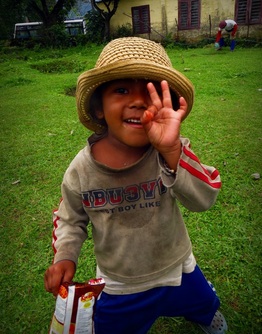
This weekend the children joined with the local police and a few other prominent community members and held a sanitation day down at Phewa Lake. It was good to see so many actively involved in the effort to remove garbage from the shore, and with Rishi using a megaphone to tell the families who lived near the shore the importance of proper garbage disposal and sanitation, it was another example of education and sustainability in action at Namaste. My duty for this was to document the day with video and pictures, and I was happy to oblige.
As we were packing up to head out, I was greeted by an enthusiastic and photogenic 5-year-old girl and her dad. Her smile was infectious and, while she posed for pictures for others, I learned from her dad that they lived in a shack near the lake with a literal garbage bag rooftop. He showed me his legs and arms that were completely covered with psoriasis, and told me he had been raising his daughter in their little shack since she was born. He used to be a porter for a company that leads expeditions into the nearby mountains, but then he got injured. With no disability or insurance, he was made homeless and has been unable to find work despite his best efforts and nagging injury. Heartbreaking to say the least. The warmth and tenderness with which he so clearly treated his daughter was inspiring to see and, in the face of roadblocks the size of the Himalayas themselves, they were both smiling radiantly.
Today was also the start of hip hop class! My two students, Purna (16) and Dipesh (13), are fantastic - so eager and willing to learn the craft. We started with the basics: beat, rhythm, syllables, bars, examples of words that rhyme, breathing, flow, etc. I played them examples of some of my favorite hip hop tracks from Outkast, Fashawn, and Eyedea, and then they wanted to hear examples of mine so I played them a few songs from The Fall of Atlas. I'd be remiss if I didn't mention how big a smile it put on my face to hear how much they enjoyed every example, both from me and everyone else I played.
I gave them their assignment for the following week: write a short essay about their lives for me to read so that we can work together to turn it into a song and, as much as they want, write a hip hop song about anything (minimum of 8 bars). Once we get a good verse written, I'll record them rapping it over a beat I make next week. After they record, I'll do the same with kids in other countries where I volunteer. When I get home, I'll put all the verses together on one big track, post it on iTunes and other places online, and give the proceeds to all of their orphanages. I can't wait to hear what they come up with for the song!
As we were packing up to head out, I was greeted by an enthusiastic and photogenic 5-year-old girl and her dad. Her smile was infectious and, while she posed for pictures for others, I learned from her dad that they lived in a shack near the lake with a literal garbage bag rooftop. He showed me his legs and arms that were completely covered with psoriasis, and told me he had been raising his daughter in their little shack since she was born. He used to be a porter for a company that leads expeditions into the nearby mountains, but then he got injured. With no disability or insurance, he was made homeless and has been unable to find work despite his best efforts and nagging injury. Heartbreaking to say the least. The warmth and tenderness with which he so clearly treated his daughter was inspiring to see and, in the face of roadblocks the size of the Himalayas themselves, they were both smiling radiantly.
Today was also the start of hip hop class! My two students, Purna (16) and Dipesh (13), are fantastic - so eager and willing to learn the craft. We started with the basics: beat, rhythm, syllables, bars, examples of words that rhyme, breathing, flow, etc. I played them examples of some of my favorite hip hop tracks from Outkast, Fashawn, and Eyedea, and then they wanted to hear examples of mine so I played them a few songs from The Fall of Atlas. I'd be remiss if I didn't mention how big a smile it put on my face to hear how much they enjoyed every example, both from me and everyone else I played.
I gave them their assignment for the following week: write a short essay about their lives for me to read so that we can work together to turn it into a song and, as much as they want, write a hip hop song about anything (minimum of 8 bars). Once we get a good verse written, I'll record them rapping it over a beat I make next week. After they record, I'll do the same with kids in other countries where I volunteer. When I get home, I'll put all the verses together on one big track, post it on iTunes and other places online, and give the proceeds to all of their orphanages. I can't wait to hear what they come up with for the song!
6.2.13
Day off today! Not much to report - just rested and caught up on editing pictures. Good to recharge my batteries, and made me even more excited to see the kids tomorrow.
6.3.13
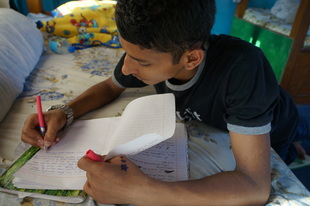
Standard day at the orphanage today, which is to say I got to spend another chunk of time with absolutely amazing kids smiling, laughing, and remembering the feeling of wonder on the daily. It's a pretty tough gig.
Purna presented me with a 16 bar verse he had written today, too, and given the fact that he wrote it in English - not his native language - it was pretty remarkable that he had solid rhymes and rhythm and it fit to the beat I played for him using my fists pounding the table during our class a few days ago. In a few days, I've no doubt he'll turn out a great verse for the song!
Purna presented me with a 16 bar verse he had written today, too, and given the fact that he wrote it in English - not his native language - it was pretty remarkable that he had solid rhymes and rhythm and it fit to the beat I played for him using my fists pounding the table during our class a few days ago. In a few days, I've no doubt he'll turn out a great verse for the song!
6.4.13
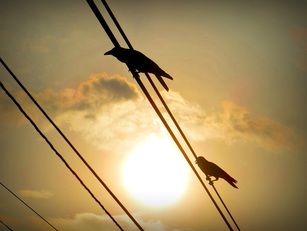
Received the assignments from Purna and Dipesh today: the essays about their lives and how they came to live at Namaste. It'd be tough to write about how harrowing they are, so I'll just put them bluntly here.
Purna grew up in Damside, a suburb a little ways away from Pokhara. His dad was a drinker and would beat him and his mom. When he was about 8 years old, his dad came home drunk and beat Purna's mom especially aggressively. Purna tried to get him to stop, but his dad was unrelenting and beat his mom to death. He told Purna that if he said anything, he would come back and kill him and his grandma. For the next couple years, Purna lived with his grandma and worked as a dishwasher and tea delivery boy in a small cafe. His grandma was not in shape physically or financially to care for him, and Purna was dropped off at an orphanage in Damside. They didn't accept him because of his size - he was severely malnourished. Visma heard about Purna and brought him to live at Namaste shortly after. He has been at Namaste since he was 11.
Dipesh has an older brother at Namaste. When they were younger, they lived with their father who worked as a farmhand in a rural village. Their mom fell sick and then left them. They weren't making enough to survive, and they moved from town to town looking for work. Eventually, their dad deserted them and they lived in the street near Kathmandu begging for food. After months living on the street and barely surviving off of the scraps people would give them, Dipesh and his brother were brought to live at Namaste several years ago.
Purna grew up in Damside, a suburb a little ways away from Pokhara. His dad was a drinker and would beat him and his mom. When he was about 8 years old, his dad came home drunk and beat Purna's mom especially aggressively. Purna tried to get him to stop, but his dad was unrelenting and beat his mom to death. He told Purna that if he said anything, he would come back and kill him and his grandma. For the next couple years, Purna lived with his grandma and worked as a dishwasher and tea delivery boy in a small cafe. His grandma was not in shape physically or financially to care for him, and Purna was dropped off at an orphanage in Damside. They didn't accept him because of his size - he was severely malnourished. Visma heard about Purna and brought him to live at Namaste shortly after. He has been at Namaste since he was 11.
Dipesh has an older brother at Namaste. When they were younger, they lived with their father who worked as a farmhand in a rural village. Their mom fell sick and then left them. They weren't making enough to survive, and they moved from town to town looking for work. Eventually, their dad deserted them and they lived in the street near Kathmandu begging for food. After months living on the street and barely surviving off of the scraps people would give them, Dipesh and his brother were brought to live at Namaste several years ago.
6.5.13
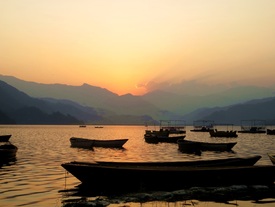
Day off, and it was gorgeous, so I wandered down to the lake and watched the sunset over the boats, gently rolling over the waves. Good medicine.
6.6.13
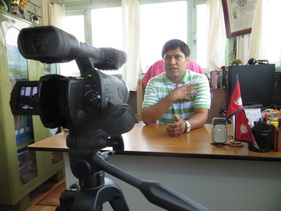
Cameras rolling on interviews at Namaste today! My interviews were with Visma (founder/director of Namaste), and all of the house mothers and sisters. I improvised with many of my questions, but I did my best to be consistent with the themes, which were mainly: what's the best way to help for those who want to, what are their favorite memories from their job, whether having volunteers generally a good thing, etc.
The best part of the interviews to me was how genuine and candid they were with their responses to each question. While their answers to each question varied, all of them thought that having volunteers is a generally positive experience, but that volunteers are most helpful when they show up with the goal of simply being present and helping on a daily basis and not trying to "fix" or "save" anything or anyone. I'm really looking forward to adding the footage of their interviews to the documentary, and based on how well these interviews went, I'm even more excited to interview some of the kids tomorrow.
The best part of the interviews to me was how genuine and candid they were with their responses to each question. While their answers to each question varied, all of them thought that having volunteers is a generally positive experience, but that volunteers are most helpful when they show up with the goal of simply being present and helping on a daily basis and not trying to "fix" or "save" anything or anyone. I'm really looking forward to adding the footage of their interviews to the documentary, and based on how well these interviews went, I'm even more excited to interview some of the kids tomorrow.
6.7.13
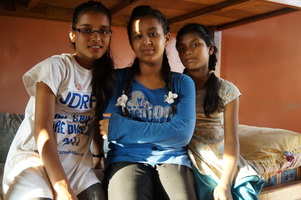
Interviewed three of the older kids at Namaste today: Purna, Sarmila, and Lalita. I was initially a bit hesitant to ask them about how they came to live at Namaste, but the three of them were open about their childhoods, detailing the struggles they triumphed over with a sense of calm, even-keeled emotion. Purna's story I already shared above, so here are Lalita and Sarmila's stories, in an extreme nutshell.
Lalita was especially particularly important for me to interview. She was the first child, ten years ago, to come to Namaste. Her story made the national news, and it goes like this: when she was six, her stepmom killed her mom. Her dad was under investigation for the murder, too. With no other relatives around to raise her, Lalita went with her stepmom and dad to prison and lived with them there. Through absolutely no fault of her own, Lalita was a six year-old inmate, sharing a jail cell with the woman who killed her mother.
Sarmila is one of the most grounded kids I've met, and interviewing her was a treat. She was so enthusiastic and joyous and happy to be interviewed. When she was an infant, her father left. Shortly after, her mom eloped with another man and abandoned Sarmila, forcing her grandmother to raise her. However, her grandparents hardly made enough money to feed themselves, let alone Sarmila or any of her siblings. Shortly after, Namaste brought Sarmila to live at the orphanage.
To say that the courage and strength of Purna, Lalita, Sarmila, and all the kids at Namaste is "inspiring" would be to call the sun "warm." It's true, sure, but the description doesn't quite do it justice. The sun is unfathomably hot, and these kids are unequivocally valiant and uplifiting. I'm blessed to know them.
Lalita was especially particularly important for me to interview. She was the first child, ten years ago, to come to Namaste. Her story made the national news, and it goes like this: when she was six, her stepmom killed her mom. Her dad was under investigation for the murder, too. With no other relatives around to raise her, Lalita went with her stepmom and dad to prison and lived with them there. Through absolutely no fault of her own, Lalita was a six year-old inmate, sharing a jail cell with the woman who killed her mother.
Sarmila is one of the most grounded kids I've met, and interviewing her was a treat. She was so enthusiastic and joyous and happy to be interviewed. When she was an infant, her father left. Shortly after, her mom eloped with another man and abandoned Sarmila, forcing her grandmother to raise her. However, her grandparents hardly made enough money to feed themselves, let alone Sarmila or any of her siblings. Shortly after, Namaste brought Sarmila to live at the orphanage.
To say that the courage and strength of Purna, Lalita, Sarmila, and all the kids at Namaste is "inspiring" would be to call the sun "warm." It's true, sure, but the description doesn't quite do it justice. The sun is unfathomably hot, and these kids are unequivocally valiant and uplifiting. I'm blessed to know them.
6.8.13
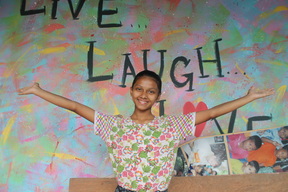
Another sanitation program today in the morning, cleaning up both sides of the road near Namaste for about a mile in each direction. Watching them pick up garbage while keeping a smile on their face, my eight year-old inner child couldn't help but feel a bit inadequate considering how much of a pouty-pants I was whenever I'd have to do something remotely resembling a chore.
Today was also largely devoted to interviews, among them Rishi (the in-charge/counselor for the kids), Anita (one of the older girls), and some of the younger children. The interview with Rishi was so good. He was incredibly animated, insightful, passionate, and answered a lot of my questions before I even asked them: an interviewers dream. Anita and the younger children shared their usual ebullient selves with me, which is always an awesome experience to capture (and share with you in the not too distant future).
Today was also largely devoted to interviews, among them Rishi (the in-charge/counselor for the kids), Anita (one of the older girls), and some of the younger children. The interview with Rishi was so good. He was incredibly animated, insightful, passionate, and answered a lot of my questions before I even asked them: an interviewers dream. Anita and the younger children shared their usual ebullient selves with me, which is always an awesome experience to capture (and share with you in the not too distant future).
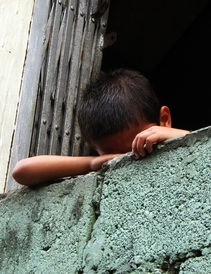
The main goal for today, though, was to have the final rap class with Purna and Dipesh. While Dipesh had an 8-bar verse written, he wasn't ready to record. Still, he seems genuinely excited to continue with this practice of self-expression I love so much, and I can't wait to see/hear what he comes up with over the next couple years. Purna, on the other hand, was ready to record. Microphone on, camera rolling, we started.
We practiced for about an hour to get his voice warmed up and to help him feel comfortable recording to the beat he listened to through headphones. After a couple dozen takes, each better than the last, Purna delivered his verse with a level of confidence and ease that belies the fact he was rapping in his non-native language, for the first time, and under a fair amount of pressure. I'm so, so proud of him.
We practiced for about an hour to get his voice warmed up and to help him feel comfortable recording to the beat he listened to through headphones. After a couple dozen takes, each better than the last, Purna delivered his verse with a level of confidence and ease that belies the fact he was rapping in his non-native language, for the first time, and under a fair amount of pressure. I'm so, so proud of him.
6.9.13
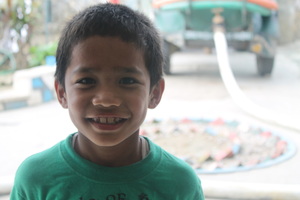
I had my last day off today, and I spet some time reflecting on my experience at Namaste. While I reflected upon the kids, the staff, how well the orphanage was run and the children were cared for, I kept coming back to one thought: I never once saw any of the children cry. Ever. Coming from such profoundly tragic backgrounds would be reason enough to make even the strongest among us weep, let alone coping with the daily challenges that come with being a kid growing up in our often harsh world.
The fact that I never saw the children cry led me to three conclusions: they are happy, they are well cared for, and they posses a strength of character and powerful perseverance that almost defies belief.
The fact that I never saw the children cry led me to three conclusions: they are happy, they are well cared for, and they posses a strength of character and powerful perseverance that almost defies belief.
6.10.13
Last day at the orphanage today. As you can probably guess by now, it's a bittersweet experience. Be that as it is, today was a celebration - the 10th anniversary of Namaste! All of the kids and the caretakers were joined by about 200 community members to celebrate the occasion. While it was a joyous event, it was also about three hours of speeches. I don't know about you, but sitting at attention for hours while listening to folks speak when you have absolutely no idea in the world what they're saying can push the limits of boredom. Apparently, some of the people on stage who had already spoken or were going to give a speech were feeling the same way. Some of them hopped on their cellphone while somebody else was having their turn on the mic. It was an interesting experience to say the least.
After saying my goodbyes to the kids until sunset, I juggled hackey-sacks with Dipak for about an hour. Though my unpacked bags were calling on me to hurry up and pack them for the early morning wake-up tomorrow, it was impossible to say no to Dipak's joy and laughter, and this will go down as one of my favorite nights in Nepal.
My bags packed, in bed by around 12, I was expecting a good 5 hours of shut-eye before the 8 hour bus ride back to Kathmandu. This was one of those nights where expectations didn't really meld with reality. With monsoon season knocking at the door, there have been several night-time storms the last couple weeks, and none more powerful than tonight. There was thunder so loud that it actually hurt my ears and shook objects in the room. It felt like I was on a soundstage in Hollywood. While I love storms, I adore sleep (which has proven to be elusive for the last 28-ish years) and tonight ended up being another in a long list of sleep-deprived nights.
After saying my goodbyes to the kids until sunset, I juggled hackey-sacks with Dipak for about an hour. Though my unpacked bags were calling on me to hurry up and pack them for the early morning wake-up tomorrow, it was impossible to say no to Dipak's joy and laughter, and this will go down as one of my favorite nights in Nepal.
My bags packed, in bed by around 12, I was expecting a good 5 hours of shut-eye before the 8 hour bus ride back to Kathmandu. This was one of those nights where expectations didn't really meld with reality. With monsoon season knocking at the door, there have been several night-time storms the last couple weeks, and none more powerful than tonight. There was thunder so loud that it actually hurt my ears and shook objects in the room. It felt like I was on a soundstage in Hollywood. While I love storms, I adore sleep (which has proven to be elusive for the last 28-ish years) and tonight ended up being another in a long list of sleep-deprived nights.
6.11.13
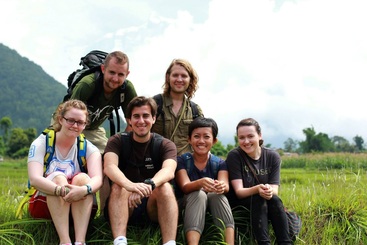
You know when you run into an acquaintance at the grocery store, make small talk with them, and then say goodbye only to run into them again back at the milk section and it's really awkward? Part of today was like that.
Goodbyes are an imperfect artform, but I'm a firm believer in the goodbye being final until the next time you see one another. After bidding a fond farewell to the new friends I made in Nepal, all of them truly wonderful people I look forward to knowing for a long, long time, I hopped in a car for the bus station. With the rain letting up, I packed my rain jacket in my duffel. Not two seconds after I handed off my bag to the bus attendant for packing under the bus did the skyward floodgates open. No matter, I thought, as I'd be sitting on the bus for the next 8 hours anyway. Or so I thought.
I figured I'd play Angry Birds or something to pass the time until we pulled out of the parking lot, and reached into my pocket for my phone. Nothing. Reached into my other. Nothing. No phone on or under the seats, either. Figs.
I hopped up and asked the attendant how long until we'd leave. 25 minutes he told me, 30 at most. I must have left the phone at the guest house. Just enough time to make it back, grab the phone, and return. With the Ganges transplanted to the clouds above Pokhara, Nepal, I was completely soaked by the time I got to a taxi. The taxi also didn't have a defroster, and by the way he was driving it seemed like he was guessing whether or not there was a car, person, or cow in front of him. I was pretty sure I was going to die in a car wreck in Pokhara (but here we are).
Made it back to the guest house, and re-said goodbye to my friends. They helped me urgently look for my phone. Nothing. Luckily, one of the workers called the driver who picked me up, and it fell out in his car, so he kindly drove it back to the bus station. Crisis averted.
Looking forward to catching up on a few hours sleep, I hunkered down in my seat, leaned against the window, and waited for the man of sand to visit me. Instead, I was kept awake by two things: the lady in front of me who reclined her seat all the way back, which apparently turned it into a flat bed and eliminated the small semblance of leg room to which I was clinging, and the woman next to me who every ten minutes violently dropped her head onto my shoulder in her slumber, woke up a few minutes later, and repeated the process for the next five hours.
Needless to say, by the time I got to my hostel in Kathmandu, I was ready to sleep before my flight to Kenya tomorrow and ensuing ten hour layover in Mumbai. Let's do this.
Goodbyes are an imperfect artform, but I'm a firm believer in the goodbye being final until the next time you see one another. After bidding a fond farewell to the new friends I made in Nepal, all of them truly wonderful people I look forward to knowing for a long, long time, I hopped in a car for the bus station. With the rain letting up, I packed my rain jacket in my duffel. Not two seconds after I handed off my bag to the bus attendant for packing under the bus did the skyward floodgates open. No matter, I thought, as I'd be sitting on the bus for the next 8 hours anyway. Or so I thought.
I figured I'd play Angry Birds or something to pass the time until we pulled out of the parking lot, and reached into my pocket for my phone. Nothing. Reached into my other. Nothing. No phone on or under the seats, either. Figs.
I hopped up and asked the attendant how long until we'd leave. 25 minutes he told me, 30 at most. I must have left the phone at the guest house. Just enough time to make it back, grab the phone, and return. With the Ganges transplanted to the clouds above Pokhara, Nepal, I was completely soaked by the time I got to a taxi. The taxi also didn't have a defroster, and by the way he was driving it seemed like he was guessing whether or not there was a car, person, or cow in front of him. I was pretty sure I was going to die in a car wreck in Pokhara (but here we are).
Made it back to the guest house, and re-said goodbye to my friends. They helped me urgently look for my phone. Nothing. Luckily, one of the workers called the driver who picked me up, and it fell out in his car, so he kindly drove it back to the bus station. Crisis averted.
Looking forward to catching up on a few hours sleep, I hunkered down in my seat, leaned against the window, and waited for the man of sand to visit me. Instead, I was kept awake by two things: the lady in front of me who reclined her seat all the way back, which apparently turned it into a flat bed and eliminated the small semblance of leg room to which I was clinging, and the woman next to me who every ten minutes violently dropped her head onto my shoulder in her slumber, woke up a few minutes later, and repeated the process for the next five hours.
Needless to say, by the time I got to my hostel in Kathmandu, I was ready to sleep before my flight to Kenya tomorrow and ensuing ten hour layover in Mumbai. Let's do this.
6.12.13
The first flight en route to Nairobi was uneventful, had a surprisingly delicious lunch, and a combination Bollywood/heist movie as the in-flight entertainment - all criteria for my perfectly ideal flight. Upon landing in Mumbai, ideal flew out the window. After watching cricket for a long enough time that I finally figured out the rules, I handed off my passport to a worker for Jet Airways to get my boarding pass for the next flight, or so I thought.
Initially, she wouldn't take my passport because I didn't have a ticket for the flight. I told her that I didn't have a ticket because I couldn't check-in online since the flight was booked through her airline but operated by another carrier. She told me without a ticket I couldn't get a boarding pass. I politely told her that was a pile of poo, and it was her job to get my boarding pass since the ticket was bought through them. Finally, she took my passport and I waited. And waited. And waited.
1am rolled around, and I was greeted by a different Jet Airways worker who told me I was going to be sent back to Kathmandu because I didn't have the necessary paperwork to enter Kenya. False though that was, I had two hours to convince them otherwise and make my 3:10am flight.
I'll leave it as a cliffhanger as to whether or not I made it to Kenya. (Spoiler alert, I'm in Kenya...)
Thank you for reading. Until next time, my friends!
Initially, she wouldn't take my passport because I didn't have a ticket for the flight. I told her that I didn't have a ticket because I couldn't check-in online since the flight was booked through her airline but operated by another carrier. She told me without a ticket I couldn't get a boarding pass. I politely told her that was a pile of poo, and it was her job to get my boarding pass since the ticket was bought through them. Finally, she took my passport and I waited. And waited. And waited.
1am rolled around, and I was greeted by a different Jet Airways worker who told me I was going to be sent back to Kathmandu because I didn't have the necessary paperwork to enter Kenya. False though that was, I had two hours to convince them otherwise and make my 3:10am flight.
I'll leave it as a cliffhanger as to whether or not I made it to Kenya. (Spoiler alert, I'm in Kenya...)
Thank you for reading. Until next time, my friends!
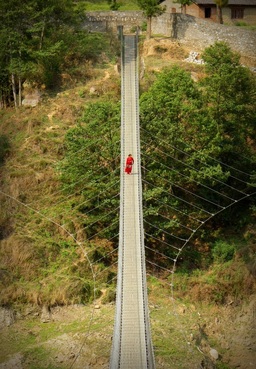
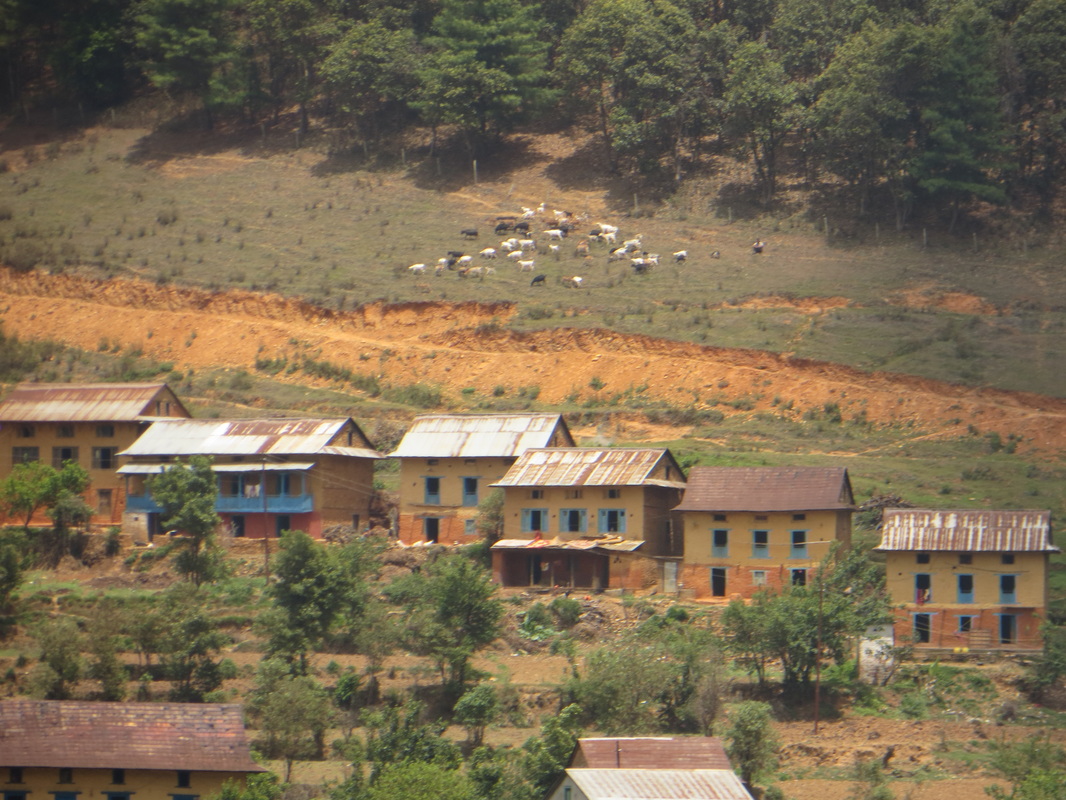
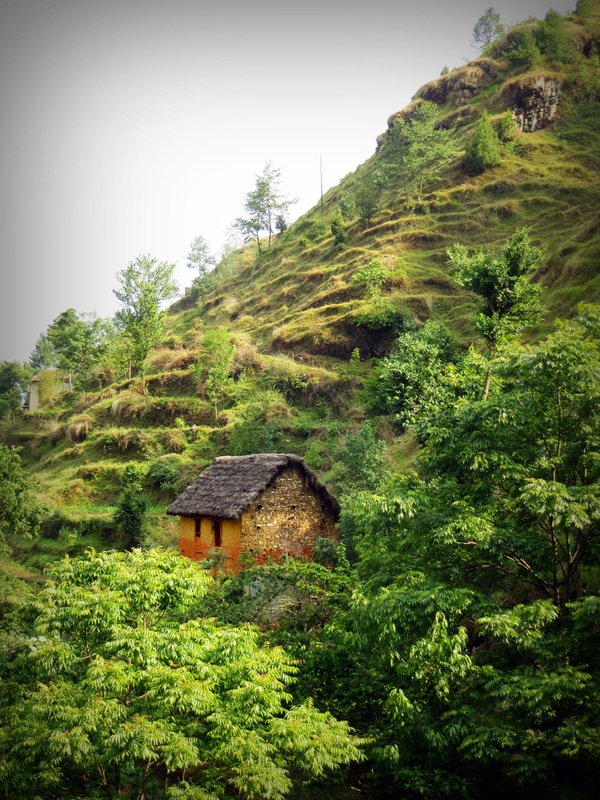
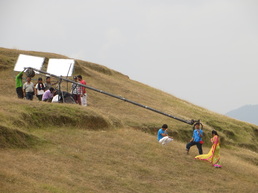
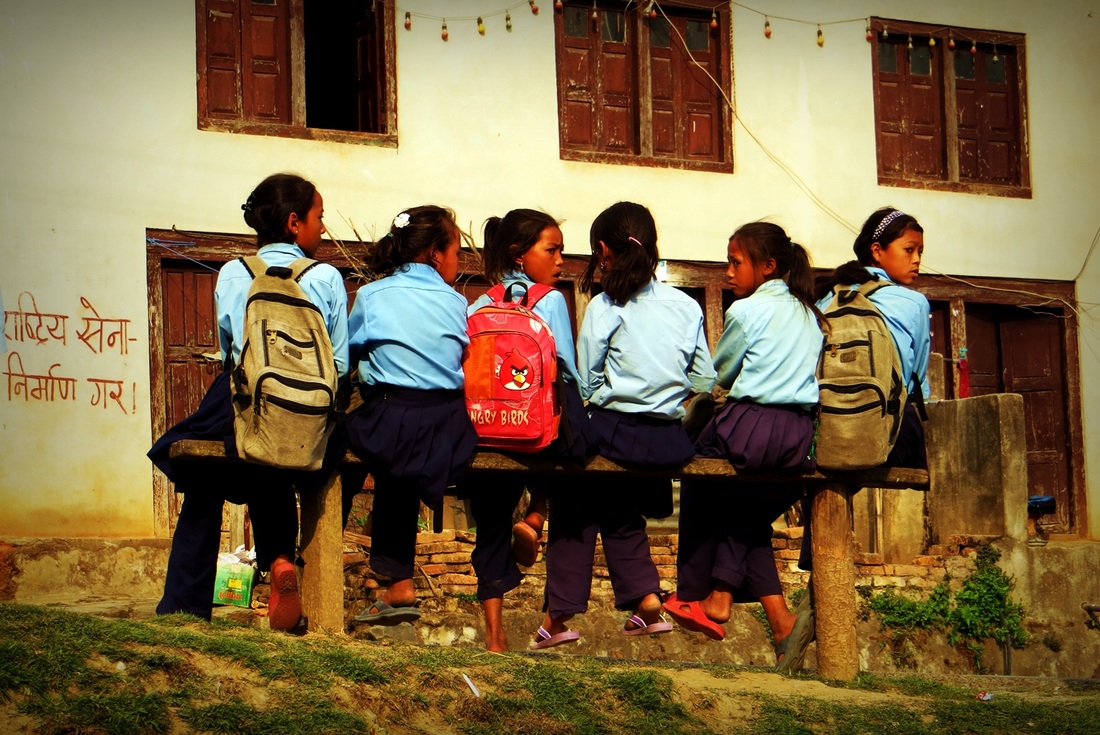
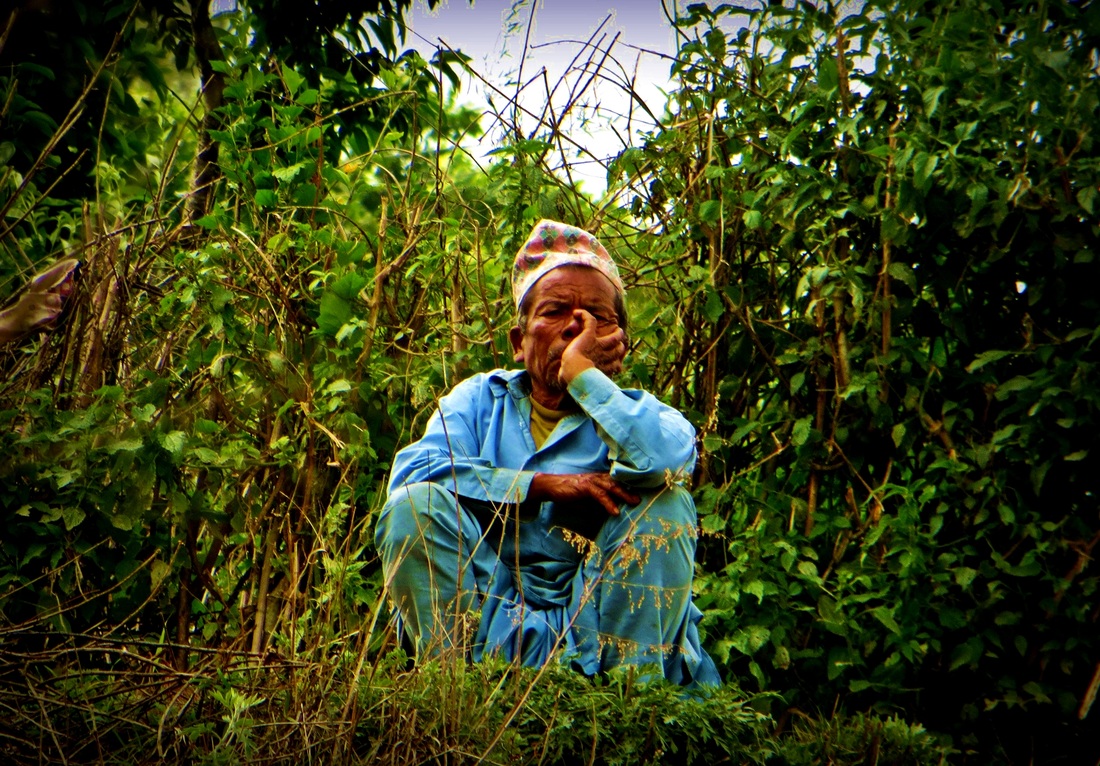
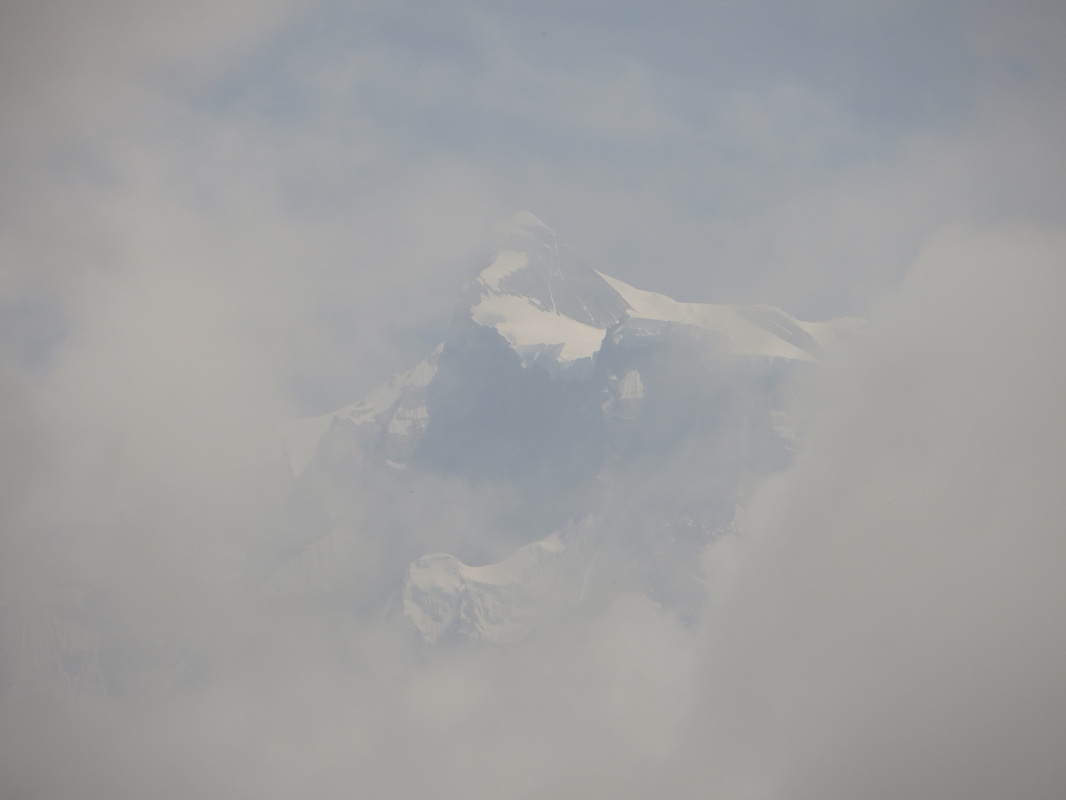
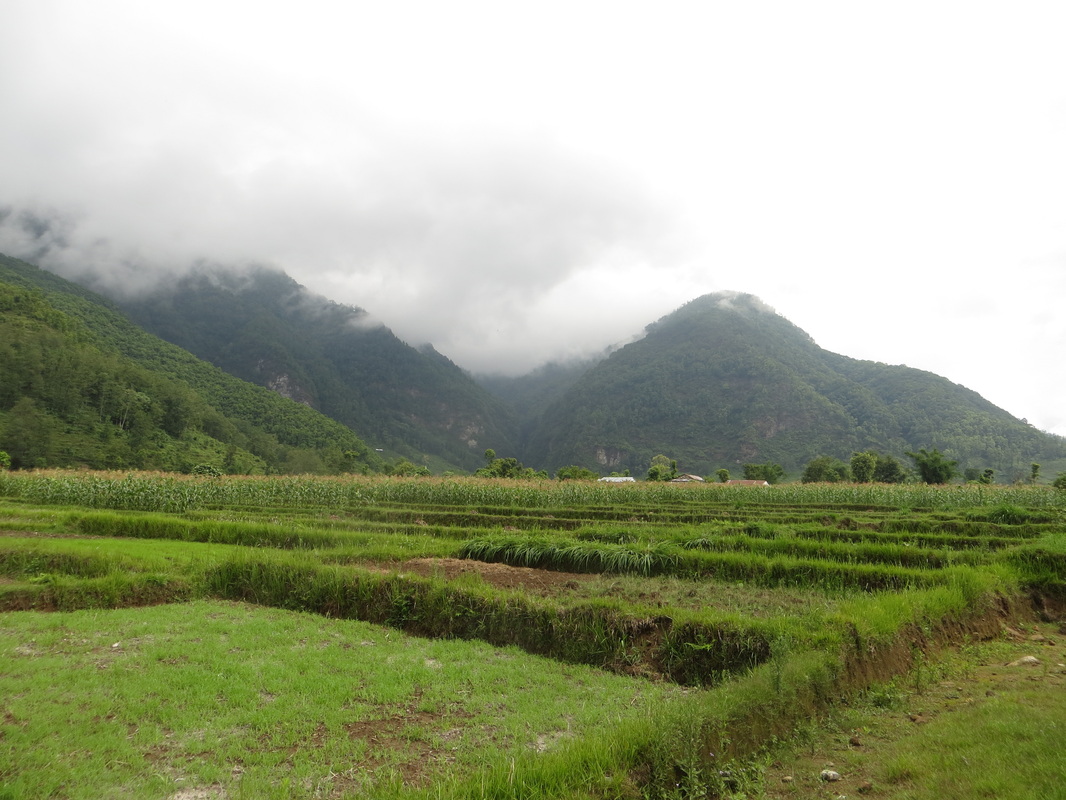
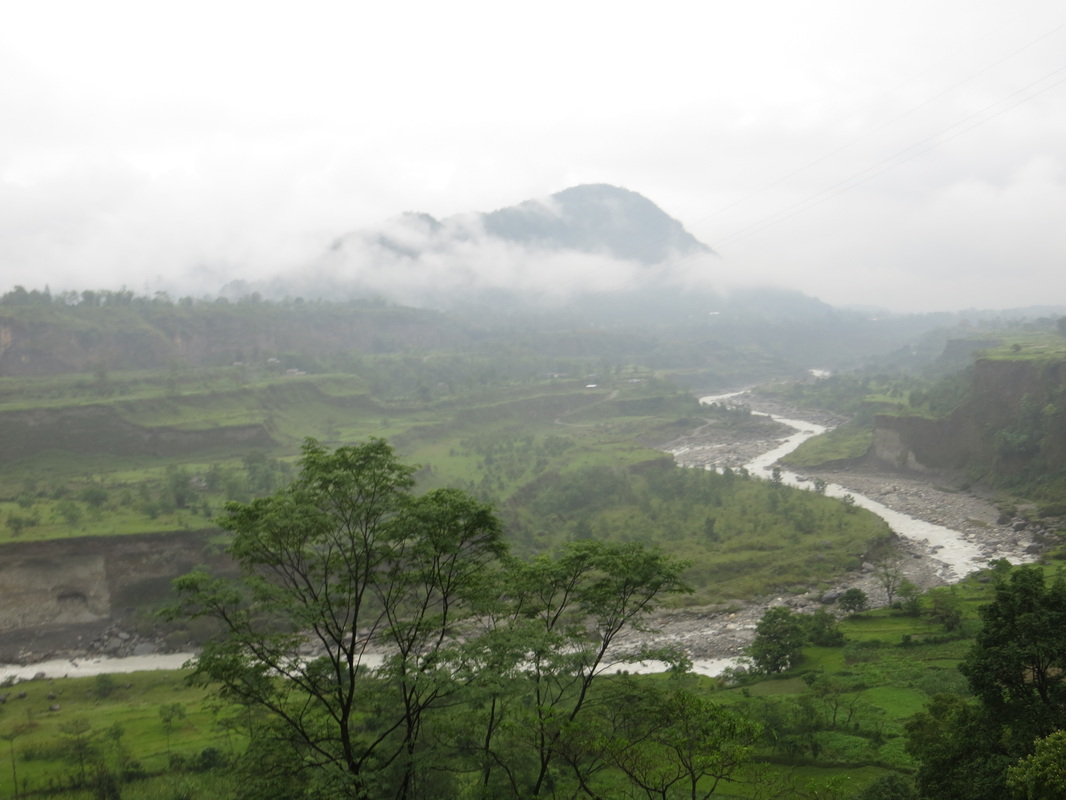
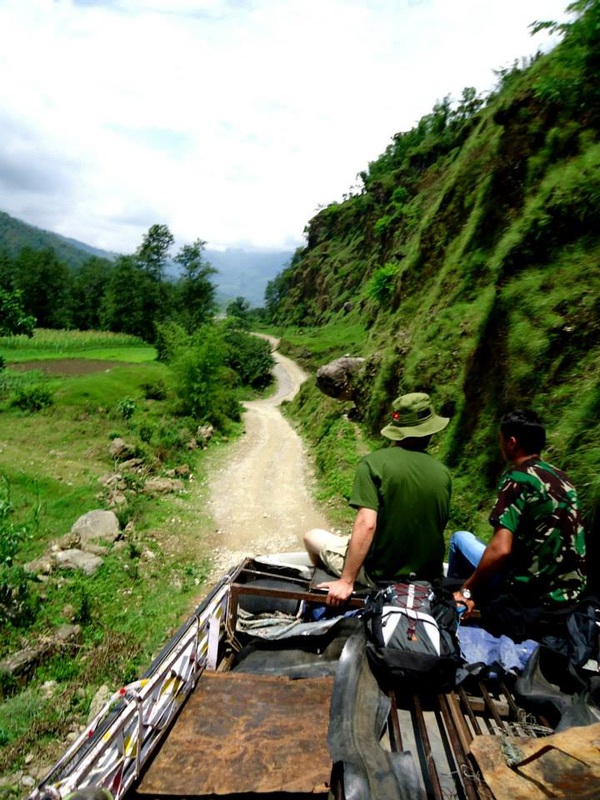
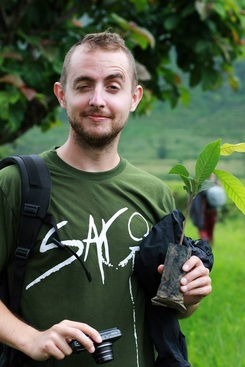
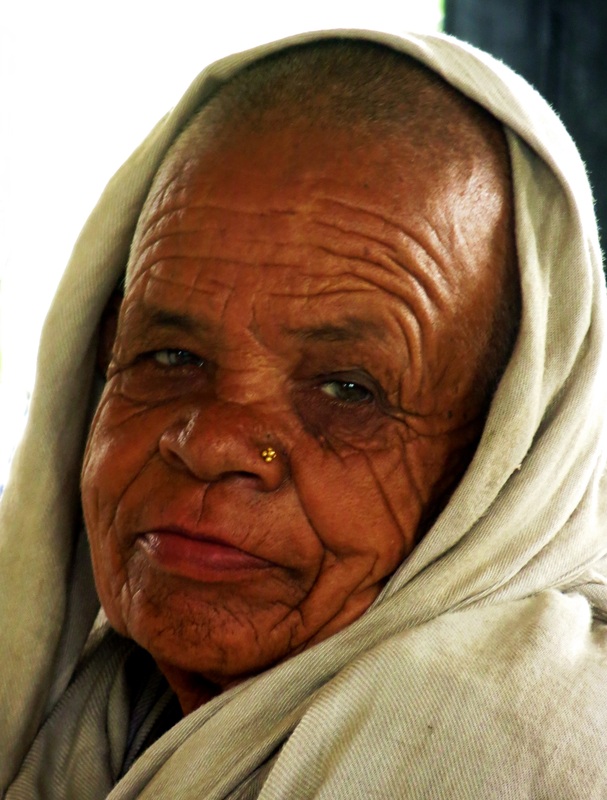
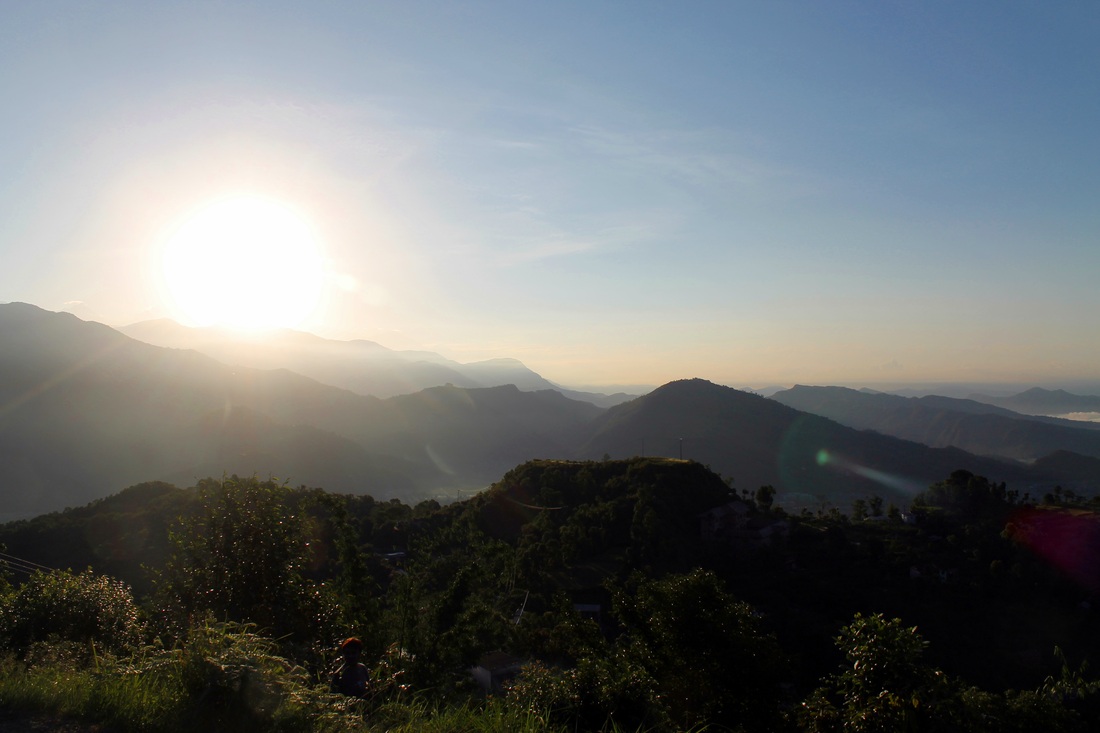
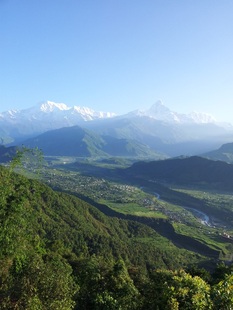
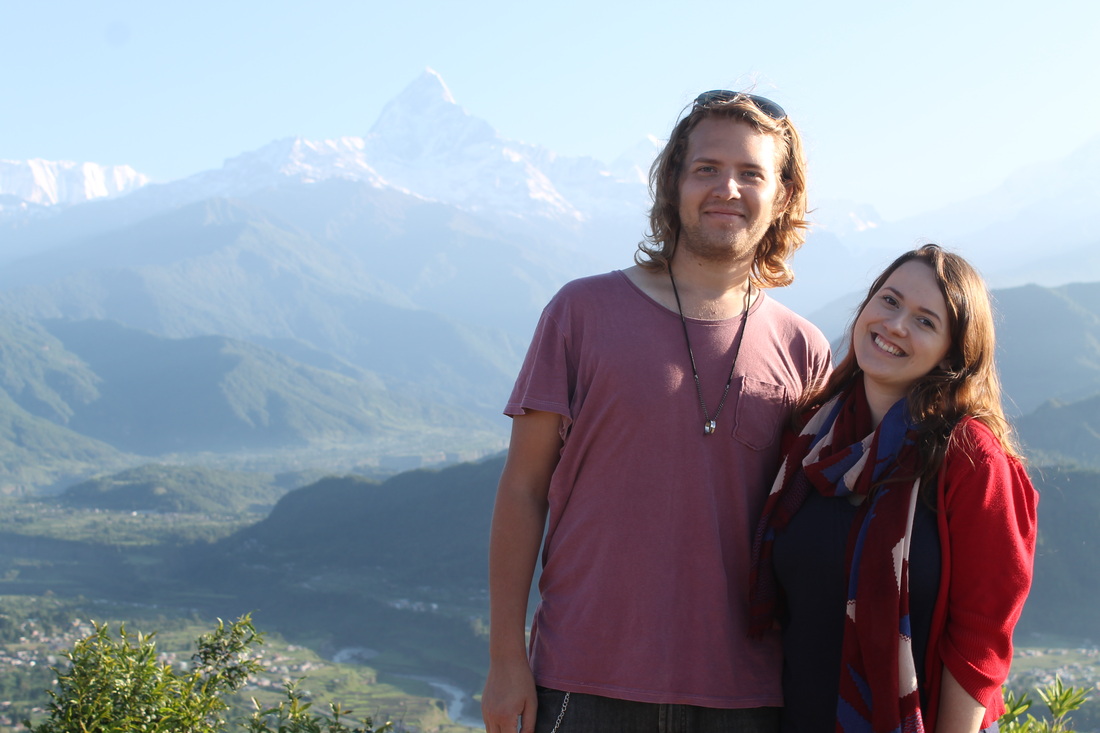
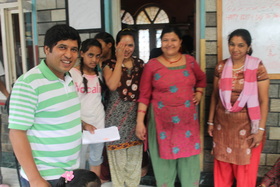
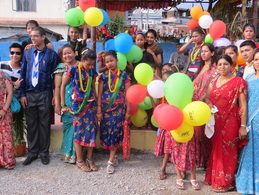
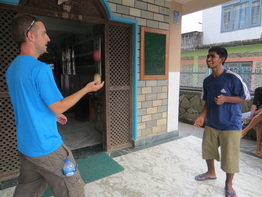
 RSS Feed
RSS Feed